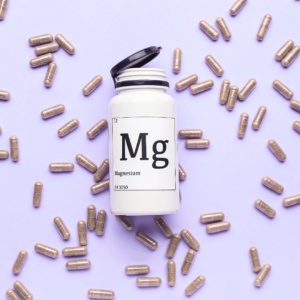The word hormone has become convoluted over time; “I’m hormonal”, “My hormones are acting up again”, “Is it your hormones?!”.
But what does this actually mean? How are they involved in the menstrual cycle? What do they actually do?
Meet your team of hormones that strive to support you, each and every cycle.
Gonadotropin Releasing Hormone (GNRH): This hormone we could really consider to be the instigator of the menstrual cycle. GNRH is released from the hypothalamus in the brain. The
hypothalamus is like the brain’s command centre. GNRH gets released to chat to the pituitary gland for the next steps of the cycle.
Follicle Stimulating Hormone (FSH): This hormone is released from your pituitary gland (in response to the stimulation from GNRH). FSH does just as it is named, it stimulates your follicles! Follicles are small fluid filled sacs on your ovaries each containing an immature egg.
Each menstrual cycle a selection of your follicles get stimulated to grow, with one follicle ultimately being selected to ovulate.
Luteinizing Hormone (LH): Our TTC gals may know LH well, this is the hormone that is being tested with ovulation urine tests. LH tests or ovulation tests do have some flaws that we will cover for you in a future blog! LH is the trigger hormone that tells the follicle it’s time to release that now mature egg. LH levels will rise dramatically just prior to ovulation to send the ovary this message.
Oestrogen: Oestrogen is our growth and development hormone. Oestrogen thickens up our uterine lining after it sheds with our period and signals the release of cervical mucus. Oestrogen also has effects not just on our cycle but many other areas of the body. Oestrogen also influences brain health, cardiovascular health, bone health, mood, skin, hair, breasts and so much more! She’s an important one. We also want to keep oestrogen in check, too much or too little oestrogen can lead to a lot of dysregulation in the body, from missing periods to debilitating flooding periods, PMS and period pain. She has to be juuussst right (tips on how to achieve this to come!).
Progesterone: Has a profound effect on GABA receptors in the brain, keeping us cool, calm
and collected. Progesterone is released in large quantities after ovulation and helps to hold the uterine lining in place before the next period begins, or if pregnancy occurs. Progesterone is critical for pregnancy, with its name stemming from “pro-gestation”. Progesterone also influences brain health, bone health, the immune system, lowers inflammation, supports mood plus so much more. Lower levels of progesterone can result in a short luteal phase, PMS, premenstrual spotting, fatigue, low body temperature, fertility issues and more.
We can see now that our reproductive hormones are pretty important right? Our hormones support our body to function optimally, they’re not just important for fertility. When they are out of balance or if we don’t have them at all (eg. not ovulating), chaos can ensue. At FemTek we love helping you to understand and work with your hormones, instead of against them.
Lauren Curtain
Lauren Curtain is a registered Chinese medicine practitioner, women's health focused acupuncturist and herbalist. She centres her practice around supporting women to navigate their hormones, menstrual cycles and fertility using a combination of education (all the women’s health info you didn't get in high school), acupuncture, herbal medicine, nutrition and lifestyle support. Lauren believes every woman has the right to know how her body works, and what she can do to optimise not only her reproductive health, but whole body health. Lauren has seen firsthand with her patients the dramatic improvements that can be made to reproductive health through simple, inexpensive, non-invasive techniques and firmly believes symptomatic periods and menstrual cycles can be a thing of the past and we can embody a thriving fertile life.





